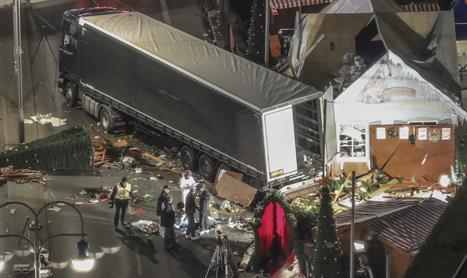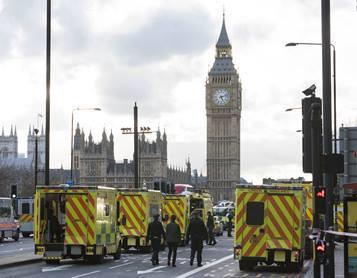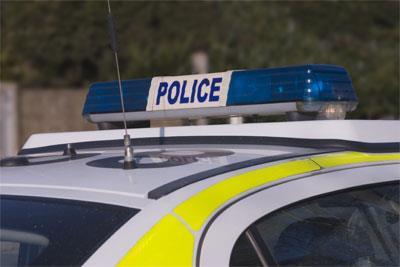
Following the fatal London attack yesterday at the Houses of Parliament, Motortransport takes a look at what the road transport industry can do to minimise the risk of such incidents.
In Berlin on 19 December 2016, 12 people died after a Scania R450 was driven into Christmas market stalls by Isis-inspired terrorist Anis Amri. He had earlier hijacked the truck, killing its Polish driver, Lukasz Urban, who had been hauling a delivery from Italy to the German capital. The Polish delivery firm he worked for – Ariel Zurawaski – said they had lost contact with him hours before the attack.
On 14 July 2016, Mohamed Lahouaiej-Bouhlel drove a rigid truck into a crowd of people watching a firework display on the promenade in Nice, killing 86 people. He had hired the vehicle from a rental firm and was driving it despite vehicles over 3.5 tonnes being banned from the promenade at all times.
But could this happen in the UK? If the threat exists how can the haulage industry, owners, drivers and manufacturers best respond?
Raffaello Pantucci, director of international security studies and a counter-terrorism expert at the Royal United Services Institute think tank, said a copy-cat truck attack is likely.
“Given the ease with which such attacks can be perpetrated, the fact we have now seen a few successfully deployed internationally, the presence of radicalised people in the UK and the ease of sourcing trucks, it is now a key part of the threat picture in the UK,” he said. “Its likelihood is probably as high as most other sorts of attacks.”
Weak spots
Looking at the characteristics of the Berlin and Nice attacks it is possible to identify a few weak spots in the haulage sector that could be strengthened to help prevent such an attack. First of all – transport restrictions. These failed in Nice, but how does the UK compare? Are changes needed?
The Home Office said policing of temporary events such as Christmas markets, festivals and sporting events is a routine policing activity, including transport restrictions and road closures.
“Local forces identify and review security measures for local events, recommending and deploying security measures appropriate to the level of threat and vulnerability,” the spokesman said.

Christopher Snelling, the FTA’s head of national and regional policy, said hauliers should expect more restrictions, particularly around public events. “This isn’t just about HGVs; vans and cars could also cause damage in a terrorist attack,” he said.
One example came soon after Berlin when London’s Metropolitan Police announced a three-month trial of road closures for the Changing of the Guard ceremony outside Buckingham Palace.
Expectations
Any further operational or legal changes in this area are unlikely at present. “An introduction of vehicle searches before they enter certain areas would damage the economy as movement is slowed. It would also lead to large groups of people congregating in one area, which would be ripe for a terror attack,” said Jared Dunbar of Dyne Solicitors.
“They could introduce restrictions on certain-sized vehicles in areas around events or on certain holidays. Again, this would have negative effects for the economy,” he said.
Pantucci said hauliers should also expect to see an increase in road furniture. “We are likely to see more bollards and urban architecture to keep traffic from pedestrians, and efforts made to provide more secure cover and protection in areas where there are large gatherings of people,” he said.
Haulage owners and drivers could do more to prevent trucks being used in attacks. Chrys Rampley, manager infrastructure, security and business affairs at the RHA, said. “We keep being told that there is no intelligence of a likely attack in the UK but everyone needs to make sure they are prepared after Berlin.”
She said the RHA received an update from the National Police Chiefs’ Council’s counter-terrorism unit soon after Berlin urging transport firms to “consider the security of vehicles of all sizes and the safety of vehicle operators”.
It advised drivers to park their vehicle legally in secure well-lit areas, off the street where possible and ideally in an authorised truck park to prevent theft or hijack. Drivers also need to secure their vehicle and load when left unattended and to secure the cab at all times. For owners, it urged them to make sure they verify the ID of the person driving their vehicles and their documents.
Rampley added: “There is a driver shortage but owners need to do proper checks on all the people driving or looking to drive for them. They need to understand their drivers better, which will help them recognise any changes in behaviour. If they see anything suspicious, they should report it.”
Snelling added: “Operators need to be especially aware of their driver’s route and location. If something peculiar happens, they need to be able to respond swiftly.”
Policing
There are concerns however over another part of the police’s advice. “They say to find a secure place to park,” said Rampley. “But there are not enough safe places to park in the UK, including service stations where we have seen vehicles attacked. It is an ongoing issue and we continue to talk to government about this.”
Pantucci said that the police could also take more direct action in future around the hiring of trucks. “We might see the police paying greater attention or asking for greater degrees of scrutiny around those who are seeking to rent or purchase such trucks.”
Preventative measures
Rampley stressed that the police and industry are working closer together to combat the threat. She said training and awareness events under the National Counter Terrorism Security Office’s Project Griffin had been stepped up since Berlin. Project Griffin helps businesses become more aware of counter-terrorism preventative measures.

“We are working with a number of regional counter terrorism teams to get the message out to our members and drivers,” she said. “The coverage is a bit patchy at present, with some regions more proactive than others and doing different levels of training. But we are in touch with the units about this.”
She warned that a reduction in police numbers was making some of these conversations more tricky. “We have lost a lot of good officers who knew about the haulage industry. We find that we have to explain the industry more to National Counter Terrorism Security Office units. It is a learning curve for them,” she said.
The Berlin truck had an autonomous emergency braking system, which kicked in and prevented further carnage. “Ensuring this is universal would be a good idea,” suggested Raffaello Pantucci. So-called ‘kill switches’ are also being developed.
The RHA’s Chrys Rampley said it has been working with the Home Office for at least the past five years on Project Restore, which stands for the Remote Stopping of Road Engines. There is obvious secrecy around how the system works, but it will allow the police to stop and immobilise a vehicle remotely if it is seen as a security risk.
“Stinger devices do not work on large vehicles so we need another way of stopping or slowing a vehicle down,” Rampley said.
Tech group Trans Tag, which has also been working on the Restore project, said it is seeking type approval for the equipment.
MD Steve Clark said: “An operator will be able to stop one of its vehicles from starting remotely but will not be able to do some of the things the police can do. It helps operators secure their vehicles and has a tagging system to help identify drivers.
“We expect a big demand from transporters of high-value goods. If a truck is stolen, instead of a long police pursuit the truck can be stopped remotely and safely.
"It gives operators more comfort over security and shows the authorities that they are doing all they can to keep trucks out of terrorists’ hands,” said Clark.
By David Craik.
Image: Press Association.
This article first appeared in Commercial Motor 19 January. Subscribe today for all your weekly haulage news, legal and the best used truck deals.













